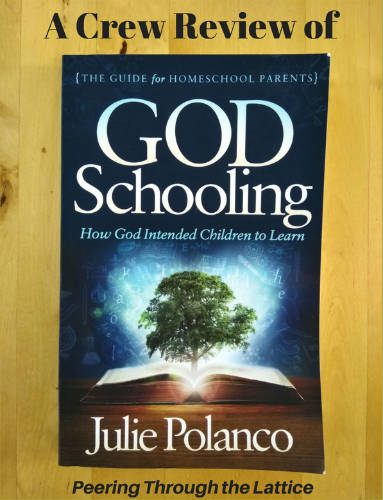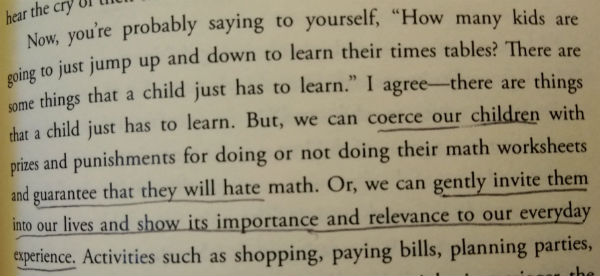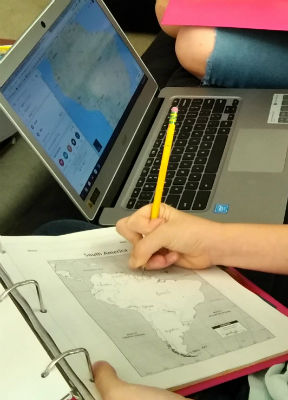Have you ever noticed how much easier it is to learn about topics you are passionate about? Kids are that way too. But is catering to our children’s interests and passions biblical? God Schooling: How God Intended Children to Learn, a new book by Julie Polanco, examines what the Bible says about this idea.

God Schooling focuses on natural learning, also known as unschooling. I am familiar with this idea of child-led learning. Often I strive to include elements of it even in subjects for which I use a traditional curriculum. I had never before read a book that addresses unschooling from a Christian viewpoint.
Biblical Foundations for Unschooling
The first chapter dives into Scripture, exploring verses that support unschooling. Julie punctuates the chapter with stories from her homeschool experience. Having homeschooled for fifteen years myself, I could relate to these anecdotes.

As Julie examined the educational style in light of the Bible, I was easily convinced of the value of natural learning. Julie’s real-life examples inspired me to give my kids greater ownership of their education.
I started implementing changes the day I read this chapter. When my twin daughters wanted to take school time to explore and identify rocks and minerals, I encouraged them. The distraction became the lesson. Soon they were passionately teaching one another and learning together. Instead of insisting they return to my plans, I gave them the freedom to explore.
Motivation
The second chapter talks about motivation and excellence. Is offering prizes or rewards the best way to help kids learn? Julie argues that these external motivators are ways of exerting control over our children.

Utilizing their internal motivators is far more effective. How should we motivate our kids? Help them explore topics they are curious about. Share our enthusiasm for a subject with them. Encourage them to set goals and pursue them. Along the way, we should aim for excellence, expecting them to do the best they can, not just enough to make the grade.
Unschooling Different Ages
The next three chapters offer practical suggestions for unschooling various ages. Since my twins are twelve, I paid particular attention to the chapter on preteens. Julie recommends that students from eight to twelve years old learn through life experiences more than academic study.
How should an unschooling parent teach?
- Find opportunities for kids to serve.
- Encourage them to develop their interests.
- Expose them to God’s wonderful world.
- Provide an abundance of ideas for them to explore.
- Give them time to play and explore these ideas in an unstructured way.
- Share personal interests with them.
- Be excited about what excites them.
What About Teens?
The chapter on unschooling teens explores college and alternatives to it. Should every homeschooled kid go to college? Julie doesn’t think so. It is refreshing to find a book offering practical alternatives which will not break the bank or indoctrinate our kids with secular views.
Julie highlights the importance of fun and friendships in the high school years. She shares creative ways to cover the necessary academics. The chapter ends with a brief discussion of transcripts and graduation.
What Kind of Learner?
I appreciated the chapter entitled, “Spreading the Banquet.” Julie compares the way kids eat to the way they learn. All moms can relate to this. From babies to picky eaters to those who will eat anything, they all have a counterpart in the consumption of knowledge.
Still More Practical Advice
The book wraps up with short chapters which cover:
- practical suggestions to get started with this type of education
- some Q & A
- advice on record keeping
What These Principles Look Like in Our Homeschool
Am I an unschooler? No. Will I ever be one? Probably not. But I can relax the academics to allow time for free exploration and learning that is meaningful to my kids.
With my twelve-year-old twins, this means greatly reducing their required math time. Instead, I allow them to spend hours pursuing one of their passions—learning about rocks and minerals. Who knows? They might do a little extra math as they calculate how many carats their favorite find is!

While reading a God’s World News article last week, I asked each girl to label Peru on an outline map. They could not resist labeling every country in South America. I was on the verge of asking them to put their maps away so we could move on. Then I reconsidered. Wouldn’t they learn more if I allowed them to pursue their momentary interest? They need the freedom to explore geography since they are clearly fascinated with it.

How can I incorporate natural learning for my tenth-grade daughter? At her request, I allowed her to make a coconut cream pie from scratch. I even called it school.

She learned more about cooking, math, and science than she could have picked up from any textbook. It was a fun experience, and we all enjoyed a special treat.
Should You Read This Book?
Homeschoolers of all varieties can benefit from reading God Schooling. Whether you use traditional, classical, Charlotte Mason, eclectic, or unschooling methods, you are certain to find practical ideas and suggestions to help you teach your kids.
God Schooling: How God Intended Children to Learn usually sells for $16.49. Until August 22, you can snag the ebook version of Julie’s book for half price.
